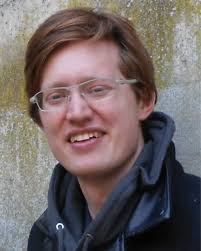
Niels is our project’s newest member. He is a Philosopher of Physics. He studied Physics, Maths and Philosophy at Münster (BSc Physics, BSc Mathematics), Lund, Oxford (MSt in Philosophy of Physics) and Cambridge (MASt in Advanced Mathematics, also known as Part III). We talked to Niels to learn more about his work and his interest in the New Directions project.
Tell us a bit about your background
I finished my PhD on the philosophy of quantum gravity in Geneva under the supervision of Christian Wüthrich last December. For my dissertation, I investigated how we motivate, construct, pursue and pre-empirically evaluate theories of quantum gravity. I also dealt with the conceptual gap problem between general relativity and quantum gravity. Since January 2020, I have been employed as an `assistant’ at the chair of Theoretical Philosophy at the University of Bremen (held by Norman Sieroka); in my ongoing habilitation project, I am interested in epistemic access to spacetime structure. From July to December I am a postdoctoral fellow at the Rotman Institute, working under the supervision of Chris Smeenk; the position is funded by the New Directions project. For 2021, I plan to come back to the institute for shorter stays on a regular basis but will otherwise pick up my work in Bremen again.
What first sparked your interest in cosmology?
Well, I have always been interested in cosmology! Who hasn’t? But the admittedly vague interest only became something concrete when my much younger self immersed himself in Greene’s Fabric of the Cosmos about 15 years ago. This book is surely one of the reasons for why I studied Physics later on! At an academic level, the field of cosmology became naturally more and more one of my focus interests in the course of doing philosophical work on the foundations of spacetime, on the difference between experiment and simulation, and on issues of theory pursuit in lack of empirical data.
How did you get involved with the New Directions project?
I had the great privilege to take part in the Rotman summer institute in philosophy of cosmology in 2018 where I could already get to know the project’s directors Chris Smeenk and Jim Weatherall (then still the PIs of a predecessor grant) as well as other project members.
When looking for postdoc positions roughly a year later, the job ad for a position at the Rotman Institute in course of the New Directions project was very welcome.
What are your current research interests?
As the next bigger thing, I plan to apply certain general insights on generative strategies, non-empirical justification, and principles in the context of quantum gravity to cosmology. Secondly, I seek to analyze the conceptual implications behind various quantum theories of quantum cosmology. Apart from this, I also do research on laws of nature and the question for their modal status, such as whether (at least some) physical laws can be metaphysically necessary.
Much of your work focuses on principles of discovery in the context of quantum gravity. Much of twentieth century philosophy of science rejected analysis of the so- called “logic of discovery”. What do you think we can learn about fundamental physics from conducting a philosophical analysis of discovery?
Let me take the case of quantum gravity: In the context of quantum gravity, familiar philosophical issues such as spacetime emergence, the empirical coherence problem and even non-empirical confirmation are all part of what one could call the context of justification. Many important issues of a philosophy of quantum gravity are, however, either issues from what has been called the context of pursuit or the context of generation:
Argument and principle reconstruction and assessment — so typical of the current philosophy of quantum gravity literature — first of all amount to pursuit-worthiness considerations. And to study generative strategies such as quantisation or guiding principles is to take interests in the context of generation. Contra the anti-discovery folklore, so-to-speak.
Now, what do we learn? Through philosophical analysis of aspects of discovery, the practitioner in quantum gravity gains a clearer if not novel perspective on the avenues towards a theory of quantum gravity from GR — or at least obtains some methodological inspiration for rethinking her own perspective for why principle X is pursuit-worthy or why generative strategy Y should be followed. At the same time, the philosopher of science gets enriched by a collection of case studies on what scientific discovery and thus science really is, say on the role of theory interpretation for generating theories, or, for instance, that of principles and robustness analysis for pursuing theories — not from some closed and by now only caricatured historical chapters but from cutting-edge physics.
Are there any books or readings you would recommend to someone with new interest in the philosophy of cosmology?
I would always have a look at Ellis and Smeenk’s Stanford Encyclopedia entry on the Philosophy of Cosmology first — and references within. But I can also recommend to simply watch through the by now vast collection of high-quality videos on the philosophy of cosmology on Youtube at 1.5x or 2x speed.
What are you most looking forward to in working on the New Directions project?
What I most enjoy about philosophy is the dialogue. So I am really excited about becoming part of a truly inter-disciplinary community of experts on cosmology with whom I can chat in detail and work together on a topic I love.
It is good to see philosophy bring active in real.matters